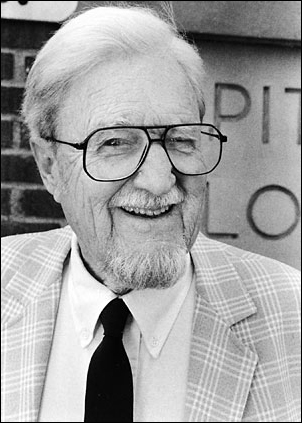April Third Movement
Rev. B. Davie Napier

Photo by Anne Napier Caffery
The Rev. B. Davie Napier, dean of the chapel and professor of religion at Stanford from 1966 to 1972, died on February 24 at Pilgrim Place, a retirement community for church professionals in Southern California. He was 91.
An ordained minister of the Congregational Church, Napier was born in Kuling, China, in 1915 to missionaries, Dr. and Mrs. A. Y. Napier. He attended schools in China and Japan, and graduated from high school and college in Birmingham, Alabama. Coming of age in the Deep South had a major impact on Napier's sense of social justice, a cause he would later champion through his sermons and activism.
Napier received a Bachelor of Divinity degree cum laude from Yale in 1939 and his doctorate in 1944. He joined Yale Divinity School's faculty in 1949, rising from the rank of associate professor to the Holmes Professor of Old Testament Criticism and Interpretation in 1956. Before coming to Stanford, Napier served as master of Yale's Calhoun College from 1964 to 1965.
At Stanford, Napier gained fame among students for his efforts to relate Scripture to the turbulent political times of the late 1960s. In 1971, he was among a small group of Bay Area clergy, professors and engineers who used nonviolent disobedience to block entry to the San Mateo Draft Board, according to Stanford News Service archives.
His daughter, Anne Napier Caffery, said the unpretentious climate at Stanford was a welcome respite after her father's many Ivy League years. She recalled how her father and mother, Joy, kept an open-door policy for students while they lived on campus. Caffery said her father wrote his most important sermons and was at his most dynamic at Stanford. And when asked in his last months which time in his life was the most fun, Caffery recalled her father saying, It was the Stanford years.
It was a time where he engaged in a political manner, which was much harder to do at Yale,
she said. It was a time of tremendous innovation for Dad and tremendous synergy with the students.
But his splash at Stanford rippled much farther, with Time magazine running an article in 1966 about a renaissance of religion
at the university and Napier's role as chaplain. According to an obituary by Yale Divinity School, Time said the combination of Napier's chapel services and the academic study of religion at Stanford resulted in an enlightened case study of how Christianity on a secular campus can be imaginatively brought to life.
Napier left Stanford in 1972 to serve as president of the Pacific School of Religion in Berkeley, but he maintained close ties with colleagues on Stanford's faculty long after his departure. Napier returned to the Farm in 1985 for Commencement weekend to lead the baccalaureate service
When Napier stepped down in 1972, then-President Richard Lyman said, Regret is hardly an adequate word to express my feelings about Dean Napier's decision to leave Stanford. In his five years here he has responded eloquently to the growing student search for religious meaning and values.
During his first major talk to students in September 1966, Napier spoke of restoring spiritual strength and resisting apathy in the face of race riots and other unrest—even evoking the Beatles at one point by describing those who insulated themselves from the injustices of the time as living in a yellow submarine.
His daughter recalled how the song was piped into Memorial Church as well.
Here is an excerpt from Napier's talk:
"The church, the God of the professionals, the institutional facades, the ceremony, the ritual and the cult—all this becomes obvious, ludicrous, and an offense—it all begins to stink when what it stands for, the love of God expressed in history and in human institutions, is ignored or denied… The temptation for all of us to live in a world devoid of compassion is as strong in education as it is in business or politics."
Napier's contributions to theological scholarship included 10 books and numerous articles for religious periodicals. He was president of the Pacific School of Religion until 1978, and in the 1970s and '80s, Napier was a visiting professor and guest lecturer throughout the country. From 1975 to 1980, he was a fellow of the Yale Corporation, and subsequently returned to Yale's Calhoun College to serve as master from 1980 to 1984.
He married Joy Robertson White, now deceased, of Bethel, Connecticut, in 1941. They had two children: John, also deceased, and Anne Caffery, of Yakima, Washington. Napier also is survived by three granddaughters and three great-grandchildren.
B. Davie Napier, dean of Stanford chapel during turbulent 1960s, dead at 91,
by Michael Penña, Stanford News, February 28, 2007. Link
The Americanization of God,
a sermon by B. Davie Napier, June 14, 1970. Link
